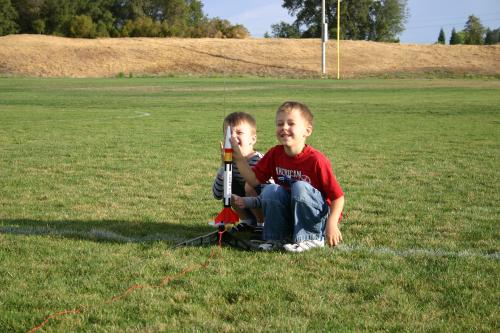First rule of business - you don't take product enhancement requests from people who are not customers. By that I mean, a salesperson who is always going to his boss or to product development saying the customer won't buy unless it has some feature or another is a lousy salesperson. And it's hard to take interface advice from people who don't use it.
I was wise enough when I started this to solicit advice from no one in science or media about what the structure would be like - it would still be under development if I had because people tend to think other people are dumb. So for a successful science site I would have needed a bunch of glitzy web 2.0 stuff and to have it at the mythical "8th grade level" instead of just letting smart scientists write what they want and not talk down to anyone. We broke a lot of rules and it worked.
With kids, it's the same thing. They don't need graphics, they don't need whirly cartoon characters and simplified examples - aren't we in a culture where millions are considered ADD because they were fed television and educational programming with simple, short soundbites instead of knowledge? - what they need instead is context.
Let's tackle conservation of momentum.
The law of conservation of linear momentum states that the total momentum of a closed system of objects (closed means it has no outside activity) is constant - the center of mass of any system of objects will always continue with the same velocity unless acted on by a force from outside the system.
Sounds complicated, right? After all, Newton had to invent Calculus to flesh out his Laws and just telling someone there is a fixed amount of momentum in the universe doesn't make obvious sense.
But it isn't difficult, really. Over the weekend, I took my sons to a nearby park with a toy Estes rocket.

If you've never seen one, these are made of plastic with some rather brilliant engineering and they can tell any kid, even a 4 year old, about momentum.
Momentum is mass x velocity, if you have forgotten.
Any student, or pre-school student, has the notion that things that go faster will do more cool stuff. In this case, the little Estes rocket is producing a gas that has very low mass but very high velocity so that has lots of momentum. But Newton's Third Law says that the rocket must have an equal and opposite force (and momentum) so the higher mass of the rocket gives it a slower velocity than the gas pushing it.

Yeah, that's right. Other parents can have their condensation experiments and their growing little plants in cardboard cups. My kid is wiring alligator clips and electricity to solid propellant engines and counting down ...
That little Estes solid propellant engine is generating a lot of momentum but it only has one way to go - out the bottom. Why does it speed up? Two reasons, really: as the firing continues, it still produces thrust but there is less mass because the engine is burning itself away, just like rockets to space; second, the burning fuel creates a constant force so it just plain builds up more and more speed.

If our little Estes rocket could go into space ( though we have a big rocket for that - see Project Calliope for details on the Scientific Blogging satellite launching into orbit October 2010 ) conservation of momentum says if no outside forces act on it, it would pretty much go forever.
But ours didn't. Their little miracle of engineering builds up just enough internal pressure it pops off the top of the rocket where a carefully folded parachute helps it float back to Earth.
How does that work? That's an article for next time.
Think you can write a better article for kids? Show me.





Comments